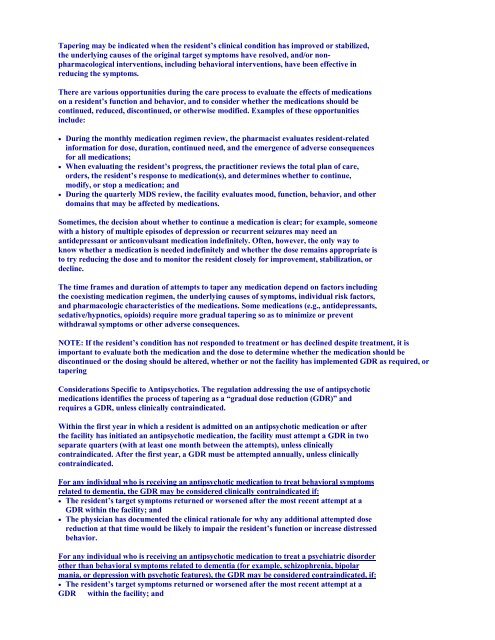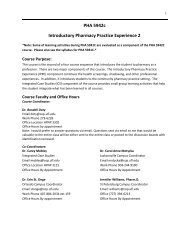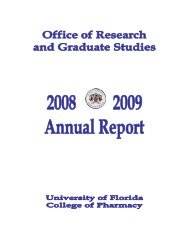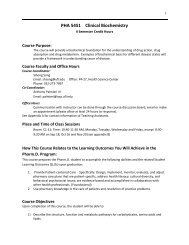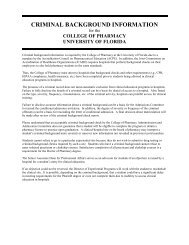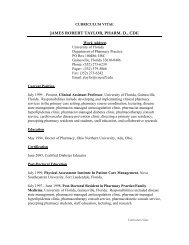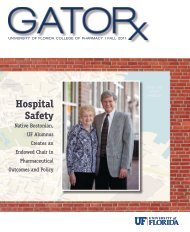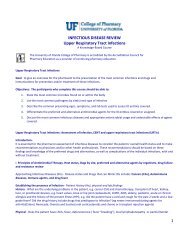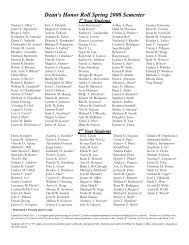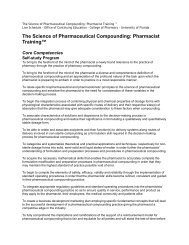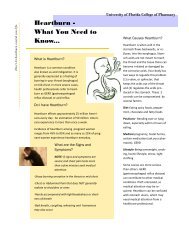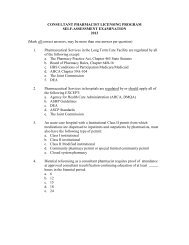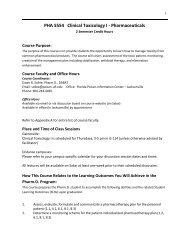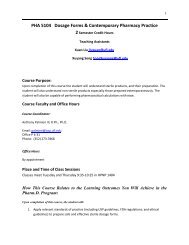Module 3: The Drug Regimen Review - College of Pharmacy ...
Module 3: The Drug Regimen Review - College of Pharmacy ...
Module 3: The Drug Regimen Review - College of Pharmacy ...
Create successful ePaper yourself
Turn your PDF publications into a flip-book with our unique Google optimized e-Paper software.
Tapering may be indicated when the resident’s clinical condition has improved or stabilized,<br />
the underlying causes <strong>of</strong> the original target symptoms have resolved, and/or nonpharmacological<br />
interventions, including behavioral interventions, have been effective in<br />
reducing the symptoms.<br />
<strong>The</strong>re are various opportunities during the care process to evaluate the effects <strong>of</strong> medications<br />
on a resident’s function and behavior, and to consider whether the medications should be<br />
continued, reduced, discontinued, or otherwise modified. Examples <strong>of</strong> these opportunities<br />
include:<br />
• During the monthly medication regimen review, the pharmacist evaluates resident-related<br />
information for dose, duration, continued need, and the emergence <strong>of</strong> adverse consequences<br />
for all medications;<br />
• When evaluating the resident’s progress, the practitioner reviews the total plan <strong>of</strong> care,<br />
orders, the resident’s response to medication(s), and determines whether to continue,<br />
modify, or stop a medication; and<br />
• During the quarterly MDS review, the facility evaluates mood, function, behavior, and other<br />
domains that may be affected by medications.<br />
Sometimes, the decision about whether to continue a medication is clear; for example, someone<br />
with a history <strong>of</strong> multiple episodes <strong>of</strong> depression or recurrent seizures may need an<br />
antidepressant or anticonvulsant medication indefinitely. Often, however, the only way to<br />
know whether a medication is needed indefinitely and whether the dose remains appropriate is<br />
to try reducing the dose and to monitor the resident closely for improvement, stabilization, or<br />
decline.<br />
<strong>The</strong> time frames and duration <strong>of</strong> attempts to taper any medication depend on factors including<br />
the coexisting medication regimen, the underlying causes <strong>of</strong> symptoms, individual risk factors,<br />
and pharmacologic characteristics <strong>of</strong> the medications. Some medications (e.g., antidepressants,<br />
sedative/hypnotics, opioids) require more gradual tapering so as to minimize or prevent<br />
withdrawal symptoms or other adverse consequences.<br />
NOTE: If the resident’s condition has not responded to treatment or has declined despite treatment, it is<br />
important to evaluate both the medication and the dose to determine whether the medication should be<br />
discontinued or the dosing should be altered, whether or not the facility has implemented GDR as required, or<br />
tapering<br />
Considerations Specific to Antipsychotics. <strong>The</strong> regulation addressing the use <strong>of</strong> antipsychotic<br />
medications identifies the process <strong>of</strong> tapering as a “gradual dose reduction (GDR)” and<br />
requires a GDR, unless clinically contraindicated.<br />
Within the first year in which a resident is admitted on an antipsychotic medication or after<br />
the facility has initiated an antipsychotic medication, the facility must attempt a GDR in two<br />
separate quarters (with at least one month between the attempts), unless clinically<br />
contraindicated. After the first year, a GDR must be attempted annually, unless clinically<br />
contraindicated.<br />
For any individual who is receiving an antipsychotic medication to treat behavioral symptoms<br />
related to dementia, the GDR may be considered clinically contraindicated if:<br />
• <strong>The</strong> resident’s target symptoms returned or worsened after the most recent attempt at a<br />
GDR within the facility; and<br />
• <strong>The</strong> physician has documented the clinical rationale for why any additional attempted dose<br />
reduction at that time would be likely to impair the resident’s function or increase distressed<br />
behavior.<br />
For any individual who is receiving an antipsychotic medication to treat a psychiatric disorder<br />
other than behavioral symptoms related to dementia (for example, schizophrenia, bipolar<br />
mania, or depression with psychotic features), the GDR may be considered contraindicated, if:<br />
• <strong>The</strong> resident’s target symptoms returned or worsened after the most recent attempt at a<br />
GDR within the facility; and


